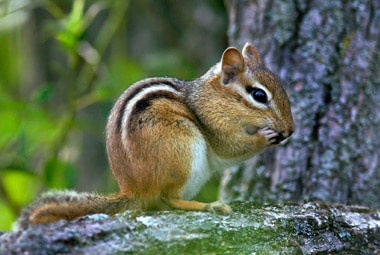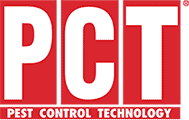
Chipmunks are a species of ground-dwelling rodent that are members of the squirrel family. They are very commonly found throughout the Eastern United States.
| Pest Identification | |
|---|---|
| Recognition | Adult chipmunks are brownish-red in color and their body is 5-6 inches in length. They have a 3-4 inch flattened hairy tail. Adults grow to weigh about 3 ounces. They have distinctive stripes on their backs; two light tan stripes and five darker black stripes. They also have two tan and two darker brown stripes on each side of their face. They also have furry cheek pouches that are used to stuff, and carry food and other things. |
| Biology | Chipmunks mate twice a year, once in the spring and then again in the summer or early fall. After mating the gestation period is 31 days and each female gives birth to 2-5 young. These young venture from the nesting area when they reach about 2/3 of their full size. When the weather cools in the late fall chipmunks enter into a restless hibernation where they become mostly inactive within their burrows. However, since their hibernation is not deep they may emerge from the ground on warm sunny days and can be seen out and about. |
| Habits | Chipmunks are generally solitary creatures except during mating periods or when they are raising young. Chipmunks are omnivores and typically feed on nuts, seeds, fruit, corn, plant bulbs, insects, eggs, and snails. Chipmunks create burrows in the ground and usually only climb up trees while trying to escape predators or searching for food. Their ground burrows usually have a 2-inch diameter entrance and can reach 20-30 ft in length. These burrows have different chambers that include a nesting area, food storage areas, and escape tunnels. Chipmunks make their burrows near the foundations of buildings, underneath decks, sheds, woodpiles, or brush piles, in flowerbeds and in lawns. |
| Damage | Chipmunks can create a lot of problems for people and their properties. They can cause damage to foundations as they burrow underneath them. They can also cause unsightly damage to lawns and gardens as when burrowing there and feed on the grass, plants, and bulbs. If a chipmunk enters into your home they can contaminate it with their urine and feces, introduce other parasites like fleas, ticks, and mites; and will chew through. |
| Professional | If chipmunks have become problematic in your home or on your property the experienced technicians at Rottler can help. We’ll eliminate and control chipmunks through exclusion techniques, live-trapping, and if necessary humanely lethal trapping. |

